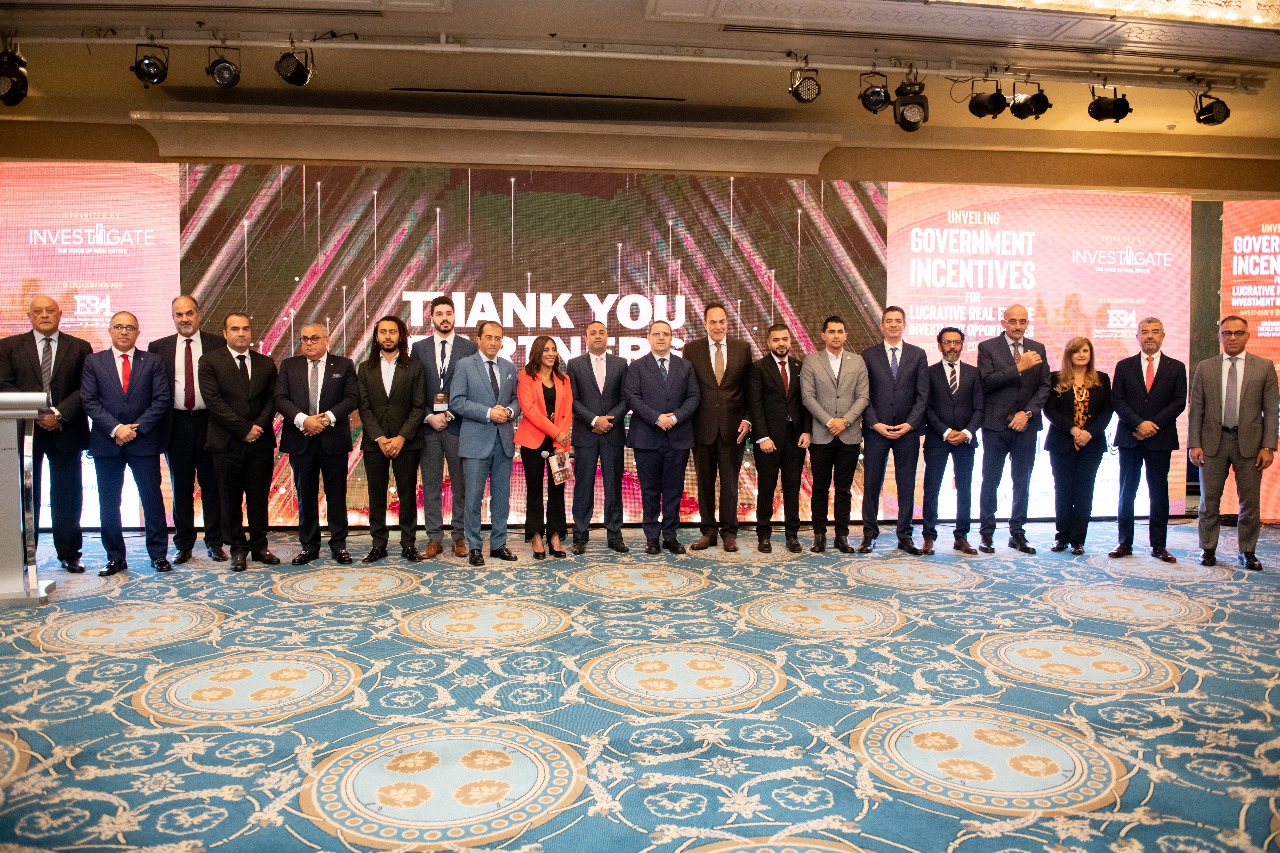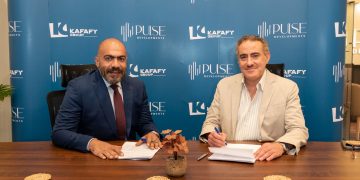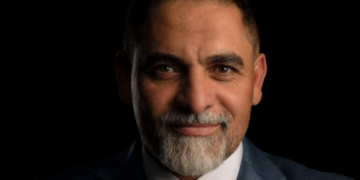Invest-Gate Reviews Government Incentives and Promising Investment Opportunities
Font size
Invest-Gate held the 20th edition of its roundtable, and the third during the year 2023, on the various incentives and facilities recently issued by the Egyptian government to support the real estate sector, and explore ways to attract foreign investments, in cooperation with the Egyptian Businessmen Association (EBA), on Monday, November 13, 2023. It took place at the Nile Ritz Carlton Hotel, under the title “Unveiling Government Incentives for Lucrative Real Estate Investment Opportunities”.
The roundtable highlighted the government’s recent efforts to support the real estate sector, in addition to discussing the role of the stock market in boosting the real estate sector since it is an essential part of the Egyptian economy.
The Egyptian government issued several decisions and initiatives in 2023 intending to revive as well as maintain the continuity of activity and momentum in the real estate sector, which has felt the impact of recent economic crises.
The roundtable included two main sessions titled “Government Facilitations and Incentives” and “Tools for Overcoming Crises” where the two discussion sessions were moderated by Eng. Fathallah Fawzy, Vice Chairman of the Egyptian Businessmen’s Association and Chairman of the Real Estate Development and Contracting Committee.
Prominent real estate experts and industry leaders participated in the roundtable, including D.Eng. Waleed Abbas, Deputy Chairman of The New Urban Communities Authority for Planning and Projects (NUCA); Mr. Mohamed Selim, Research Manager & Risk and Indices Supervisor at The Egyptian Exchange; Dr. Ahmed Shalaby, President & CEO of Tatweer Misr and Chairman of Egyptian Real Estate Council; Eng. Hisham Shoukry, Chairman of the Real Estate Export Council; Mr. Emad Saad Hamouda, Member of the Housing Committee in the House of Representatives; Dr. Hashem El Sayed, Chairman of ODIN Investments and Executive Chairman of Egyptians Real Estate Fund; Eng. Waleed Mokhtar, CEO of IWAN Developments; Eng. Mohie Farag, Chairman of Upwyde Developments; Mr. Hassan Nasr, Gates Developments CEO; Eng. Ahmed Amin Massoud, Menassat Developments Chairman; Eng. Alaa Fekry, Chairman of BETA Egypt for Urban Development and a board member of the Real Estate Investment Division; Eng. Bedeir Rizk, CEO of Paragon Developments; Eng. Mohamed Al-Taher, CEO of Saudi Egyptian Developers; Mr. Ahmed Sherif, Country Manager at Prime Properties Egypt; Ms. Maha Abdel Razek, CEO of Misr Real Estate Assets Management; Mr. Ayman Abdel Hameed, Vice Chairman and Managing Director of Tameer for Mortgage Finance (Al Oula); Eng. Tarek Bahaa, CEO of MENA Real Estate Development Consultancy; and Mr. Mohamed Al Husieny, CEO of Ethmar.
During the roundtable, experts presented and exchanged views on the importance of various government facilities and incentives, their role in attracting investment opportunities, discussed mechanisms that help in promoting real estate exports, touched on legislative amendments to facilitate foreign ownership, and the importance of launching a real estate stock exchange in supporting real estate exports and stimulating the attraction of foreign investments.
The experts also discussed recently approved investment laws, amendments to investment law(s), the government’s plan to attract foreign direct investment, and the provided facilities for developers and the contracting sector, such as project implementation timelines, bank facilities, and land acquisition assistance.
In this context, Eng. Fathallah Fawzy, Vice Chairman of the Egyptian Businessmen’s Association and Chairman of the Real Estate Development and Contracting Committee, said that real estate development activity is an essential pillar in the development taking place in Egypt, as the real estate sector is linked to 120 direct and indirect economic activities. Real estate is a top priority in Egypt since there are up to 1 mn marriages annually, a trend which has pushed the government to build new cities and offer various incentives to support investment by national and foreign companies.
D.Eng. Waleed Abbas, Deputy Chairman of The New Urban Communities Authority for Planning and Projects (NUCA), highlighted that Egypt is currently reaping the benefits of nine years of urban and infrastructure development, as well as the establishment of new cities. The government has provided numerous incentives and facilitations that have played a significant role in attracting foreign investments.
He stressed the collaborative nature of the real estate sector, where the private and government sectors work together to set visions and make sound decisions. The state is also working on implementing a unified form of official national identification for real estate, which will benefit the sector as a whole.
Mr. Mohamed Selim, Research Manager & Risk and Indices Supervisor at The Egyptian Exchange (EGX), said that the stock market has witnessed great demand and a significant increase in the volumes and values of transactions. He added that the stock market indicators and market capitalization have achieved unprecedented numbers, which indicates the amount of liquidity that the market enjoys. Moreover, the current time is most suitable for companies to register and offer their securities to benefit from the sources of financing provided by the EGX for companies at the lowest cost. He highlighted that EGX provides a great opportunity to increase the capital necessary for expansion and accelerate growth rates for all companies, especially firms operating in the real estate sector.
He added that the real estate sector on the EGX constitutes about 15% of the daily average volume and values of capital market trades, and that the market capitalization of the real estate sector is about EGP 134 bn out of the EGP 1.6 tn market capitalization of the market as a whole, with 36 real estate companies listed on the EGX. He noted that during the last period, companies operating in the real estate sector and listed on the Egyptian Stock Exchange achieved an increase of EGP 16 bn in their capital.
He explained that EGX is currently moving towards the real estate sector to provide new investment tools that suit the categories of investors interested in this sector, especially since this sector is growing steadily and enjoys a huge volume of investments. He pointed out that these developments are taking place in light of the recent legislative amendments related to real estate investment funds, which will revitalize and activate their role within the real estate investment system.
Dr. Ahmed Shalaby, President & CEO of Tatweer Misr and Chairman of the Egyptian Real Estate Council, emphasized the necessity of having a mechanism for sales outside Egypt in foreign currency, whether to foreigners or Egyptians working abroad. This mechanism would ensure an increase in foreign currency inflows. In return, customers would receive discounts and guarantees in case of exchange rate fluctuations. He stressed the importance of obtaining government incentives to establish such a mechanism.
In another context, Eng. Hisham Shoukry, Chairman of the Real Estate Export Council, stated that the National Real Estate ID Law is very important, and the problem is not in the law itself but in its application. He explained that the party that is most capable of implementing it is those with jurisdiction over the lands, which provides a strong database as well as confidence and transparency for the investor.
He pointed out that one of the most important problems with exporting real estate is not registering it, calling on the Ministry of Housing to transfer ownership of the land to the developer and register it when 80% of the project is completed instead of 100%.
In turn, Mr. Emad Saad Hamouda, Member of the Housing Committee in the House of Representatives, said that he had submitted a draft law to the House of Representatives to establish a union for real estate developers, similar to the current Contractors Union, to work on addressing the government officially through this union. He pointed out that work to implement this matter on the ground is underway and awaiting approval from the Ministry of Housing. Hamouda stressed the importance of accelerating the government’s approval of the draft law in order to increase the attractiveness of the real estate market during the coming period.
Dr. Hashem El Sayed, Chairman of ODIN Investments and Executive Chairman of Egyptians Real Estate Fund, stated that there are several incentives in the field of real estate in 2023 issued by the government; The law on the money market was amended to the 1995 law, and this gave an advantage to investment funds. New Law No. 30 was also issued to exempt real estate funds from taxes with conditions. Real estate funds can also be added to the real estate stock exchange within only 60 days of their approval. He called for the application of the central real estate depository to facilitate the registration and export of real estate in Egypt.
Eng. Waleed Mokhtar, CEO of IWAN Developments, also noted that the real estate market has witnessed a significant increase in sales during the recent period, and although it is a positive thing, at the same time the real estate market needs some controls and a strong system to maintain its performance. He pointed out that launching the real estate stock exchange is a good gateway to provide investors with the opportunity to purchase units in the presence of governance.
Eng. Mohie Farag, Chairman of Upwyde Developments, said that the exchange rate, the high price of inputs, and high inflation represent a major problem for the Egyptian real estate market. He added that the government facilitations that occurred were excellent at the time of their issuance, but at the present time, companies need more facilities, such as increasing the period for installments of the land price for companies from five to seven years, and making the interest 10% fixed until the end of the project instead of two years, in addition to extending the period to postpone installments from six months to two years.
In the same regard, Mr. Hassan Nasr, CEO of Gates Developments, stressed the importance of finding data on real estate in an integrated manner on an electronic platform to help the developer. He pointed out that he offered a 20% discount to every customer who buys real estate or land in dollars, demanding that the necessary requirements be implemented and building materials in Egypt. This is to make things easier for developers, create broader job opportunities and provide a product at a reasonable price amid pressure on the foreign currency.
Eng. Ahmed Amin Massoud, Menassat Developments Chairman, explained that Egypt’s currency, compared to other currencies, is very attractive for investment, pointing out the necessity of having a mechanism that allows refugees in Egypt to buy real estate in foreign currency, which will benefit the real estate sector. He indicated that amendments to the Investment Law mainly addressed the industrial developer, demanding reconsideration.
He recommended that there be clear legislation that allows real estate development companies to sell units in dollars to investors outside Egypt, whether foreigners or Egyptians abroad.
Eng. Alaa Fekry, Chairman of BETA Egypt for Urban Development and a board member of the Real Estate Investment Division, addressed the importance of providing suitable housing for the aspirations of the middle class, saying that companies are no longer focusing on the middle class, due to the high prices of the units offered.
He stated that land offering procedures have become more transparent, and called for the application of mechanization and the speedy issuance of licenses, explaining that a time frame must be set for implementing the procedures in order for the real estate sector in Egypt to become attractive for investment. He also pointed out the importance of state support for companies in foreign exhibitions, given their high cost.
In a related context, Eng. Bedeir Rizk, CEO of Paragon Developments, said that investment funds and the real estate stock exchange are tools that can help increase real estate investment in Egypt, indicating the importance of providing government incentives to companies that work to achieve sustainable development. He pointed out the presence of promising future opportunities for the real estate sector by relying on technology to overcome many difficulties that currently exist on the ground.
Eng. Mohamed Al-Taher, CEO of Saudi Egyptian Developers, explained that construction licenses are issued for one purpose, whether excavation or construction. He demanded that licenses be comprehensive to accelerate project implementation rates and reduce the cost of construction in light of economic conditions.
At the same time, Mr. Ahmed Sherif, Country Manager at Prime Properties Egypt, stated that the company has been working on citizenship and residency programs through real estate investment for a long time, and is focusing on the Chinese, Russian, and European markets. He pointed out that there is a large number of investors interested in obtaining Egyptian citizenship through investment, noting that there are hundreds of foreign investors wishing to obtain Egyptian citizenship. He called for facilitating coordination between private companies and the government in the field of Egyptian citizenship through investment.
For her part, Ms. Maha Abdel Razek, CEO of Misr Real Estate Assets Management, confirmed that a unified form of official national identification for properties is very necessary and must be realized. It is like the national identification for individuals and is no less important, as it will simplify property registration and boost the market’s credibility and transparency for foreigners. She noted that this requires unification of the form of contracts.
She called for the necessity of integrating the real estate financing system and reducing the tax bracket, pointing out that real estate financing has witnessed global success due to the presence of tax incentives, which do not exist in Egypt.
Mr. Ayman Abdel Hameed, Vice Chairman and Managing Director of Tameer for Mortgage Finance (Al Oula), addressed the issue of mortgages, explaining that mortgage volumes are developing but are still far from ambitions. He stressed the importance of establishing a database for all projects that have been financed under construction, and projects financed after construction through the unified national number, which allows the possibility of real estate refinancing for projects under construction. He noted that the cessation of financing projects under construction was for reasons, including the lack of a specific delivery date for the projects from the developers.
Meanwhile, Eng. Tarek Bahaa, CEO of MENA Real Estate Development Consultancy, stressed the necessity of selling the property in dollars to the foreign investor, which will benefit the sector and the Egyptian economy, pointing to the importance of providing the appropriate property for export, provided that it is fully finished and of the required quality. He called for the necessity of providing banks with a mechanism for financing foreign clients.
Mr. Mohamed Al Husieny, CEO of Ethmar, stated that the weakest real estate marketing tools are real estate exhibitions abroad, but the strongest are the continuous tourism marketing and the investment incentives provided, indicating that the state must follow the steps implemented in various countries to achieve greater success. He pointed out that his company used Egyptian Air Force helicopters to perform six sorties to market the property, in addition to adopting a new method in the company by distributing 1,000 real estate plots to 1,000 tourists in the Gulf, who came to Egypt to search for investment opportunities.
The sponsors of the roundtable were Upwyde Developments, Gates Developments, and Menassat Developments. Media partners included Aleqaria, Al-Borsa newspaper, Daily News Egypt, Al-Gedaan Real Estate, Elly Bana Misr program, Aqarmap, Osoul Misr magazine, Bloom portal, Property Plus, Al-Bawaba Al-Aqaria website, and Aqar Masr program.











